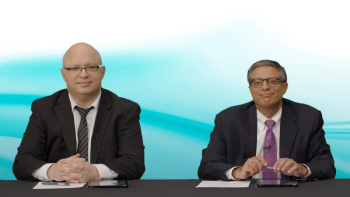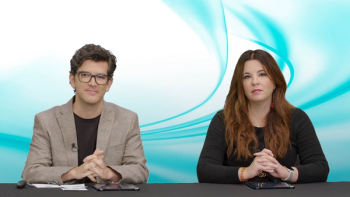
Join moderator Sagar Lonial, MD, FACP, and a panel of experts as they discuss recent updates in the management of relapsed and refractory multiple myeloma, exploring impact on clinical practice.

Your AI-Trained Oncology Knowledge Connection!


Join moderator Sagar Lonial, MD, FACP, and a panel of experts as they discuss recent updates in the management of relapsed and refractory multiple myeloma, exploring impact on clinical practice.

Explore the potential in earlier use of novel therapy in multiple myeloma, including immunotherapy, bispecifics, and CAR-T therapies, with promising responses and potential paradigm shifts.

Dive into a compelling case study showcasing the effective use of talquetamab therapy in the management of relapsed multiple myeloma, discussing responses, side effects, and treatment outcomes.

Insight into the latest updates on three approved bispecific therapies in the context of relapsed and refractory multiple myeloma, including teclistamab, talquetamab, and elranatamab, discussing response rates, administration, and side effects.

Experts share how the availability of three new bispecific therapies has transformed myeloma patient care, offering a lifeline to those previously without treatment options and showcasing positive responses in various patient populations.

Overview of challenges in managing adverse events associated with bispecific therapy in multiple myeloma, including dysgeusia, skin toxicity, and nail changes patients may experience.

Key opinion leaders share their insight on managing adverse events in myeloma treatment, including dose adjustments and prophylactic strategies to improve outcomes and patient quality of life.

Gain insight into strategies for monitoring for ICANS and CRS in myeloma treatment, including inpatient and outpatient administration, tocilizumab, dexamethasone, and impact on patient care.

A panel of experts discusses the management of adverse effects including dysgeusia and infections among patients who received bispecific therapies for relapsed/refractory multiple myeloma in the context of a clinical case.

A complex case study in multiple myeloma management, exploring treatment sequencing options for a patient with a long history of disease and multiple lines of therapy.

Expert panelists review the complex decision-making process between CAR-T and BCMA bispecific therapies in the management of relapsed myeloma, discussing patient-specific factors and relative risks and benefits.

Explore the critical aspects of counseling patients on the expectations and management of cytokine release syndrome (CRS) and immune effector cell-associated neurotoxicity syndrome (ICANS) associated with CAR-T therapy.

Leading experts discuss the evolving landscape of myeloma immunotherapy, highlighting the potential of CAR-T and bispecifics and emphasizing the need for effective management of related toxicities to enhance patient outcomes.